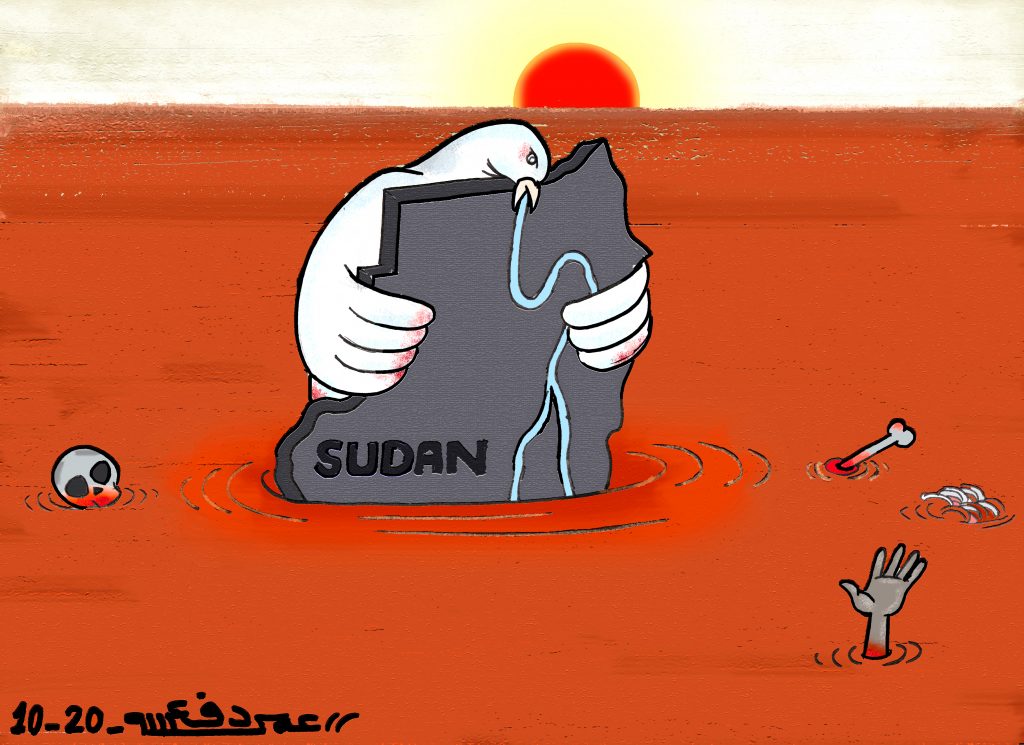Sudan reflects on double anniversary: ‘Revolutions face challenges, but they do not die’

Cartoon by Omar Dafallah (RD)
Sudan commemorates two pivotal milestones today, the declaration of independence within Parliament in 1955 and the sixth anniversary of the December Revolution that toppled 30 years of autocratic rule. While these anniversaries have historically been celebrated with fervour, the ongoing war since April 2023 has cast a shadow on this year’s observance.
Despite the dire circumstances, vigils are planned worldwide over the next two days, blending celebrations of these historic events with calls for an end to the war.
Mohamed Abdallah Abdelsalam, a leader in the National Umma Party, described the December Revolution as “one of the greatest revolutions in the region,” carrying immense hope for Sudan’s stability and progress.
Abdelsalam noted that entrenched elements of the former regime undermined the revolution, leaving it vulnerable to setbacks. He remained optimistic, asserting: “Revolutions face challenges, but they do not die.” He expressed hope that Sudan would emerge stronger, with the war exposing those seeking power over the people’s welfare.
Abdallah Solara, a federal leader and activist in South Darfur, lauded Sudan’s independence in 1955 but lamented the country’s current plight, calling the ongoing war “one of the worst modern conflicts.” Solara urged Sudanese people to reject tribalism and racism and demanded unity to build an inclusive nation.
“Sudan needs all its sons to build a stable and prosperous future,” he said, emphasising the importance of a national dialogue and a commitment to tolerance.
Lawyer and human rights activist Mohamed Abdelmoneim El Rayh reflected on the tragic irony of Sudan’s struggles. “We replaced a foreign coloniser with a national one who shatters the dreams of the people,” he said.
El Rayh linked the country’s deterioration to decades of poor governance, including the October 2021 coup, which he said plunged Sudan into a state of violence, displacement, and despair. He called for a permanent constitution to end military coups, combat corruption, and guarantee education and justice for all.
“Give the Sudanese people something beautiful to live for,” he stated, “instead of dying to achieve it.”
In a statement, El Fasher’s Resistance Committees reaffirmed their commitment to the December Revolution’s principles. “Attempts to abort this revolution by militias and remnants of the old regime will not succeed,” the statement declared, urging the Sudanese people to resist regression.
The committees condemned ongoing violence by the Rapid Support Forces, particularly in El Fasher and the Zamzam camp for the displaced, and called on the international community to protect civilians and support Sudan’s democratic aspirations.
Omar El Degir, chair of the Sudanese Congress Party, whose party cooperated in the forming of the Civil Democratic Forces alliance (Tagaddum), tweeted that peace is the only path to rebuilding Sudan. “The December Revolution’s slogan—Freedom, Peace, and Justice—was more than a chant; it embodied a break from three decades of tyranny,” he wrote.
El Degir criticised the post-revolutionary forces for division, which he said allowed counter-revolutionary forces to regroup. He called for a broad political and social movement to halt the war and restore Sudan’s hope.
“Dreams of freedom and dignity do not die,” he said. “The march towards the December Revolution’s goals will continue, no matter the challenges.”








 and then
and then